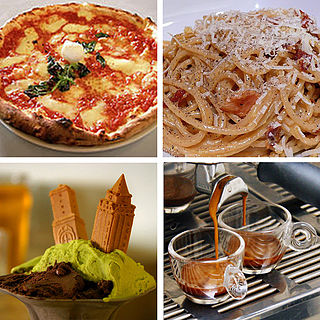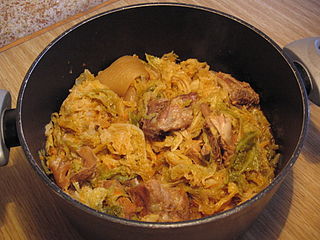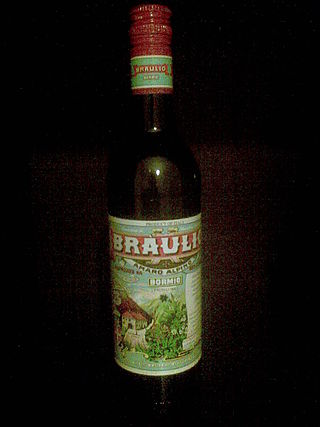Related Research Articles

Fortified wine is a wine to which a distilled spirit, usually brandy, has been added. In the course of some centuries, winemakers have developed many different styles of fortified wine, including port, sherry, madeira, Marsala, Commandaria wine, and the aromatised wine vermouth.

Vermouth is an aromatized fortified wine, flavoured with various botanicals and sometimes colored. The modern versions of the beverage were first produced in the mid to late 18th century in Turin, Italy. While vermouth was traditionally used for medicinal purposes, it was later served as an apéritif, with fashionable cafés in Turin serving it to guests around the clock. In the late 19th century, it became popular with bartenders as a key ingredient for cocktails, such as the martini, the Manhattan, the Rob Roy, and the Negroni. In addition to being consumed as an aperitif or cocktail ingredient, vermouth is sometimes used as an alternative to white wine in cooking.

A bitters is traditionally an alcoholic preparation flavored with botanical matter for a bitter or bittersweet flavor. Originally, numerous longstanding brands of bitters were developed as patent medicines, but now are sold as digestifs, sometimes with herbal properties, and as cocktail flavorings.
Campari is an Italian alcoholic liqueur, considered an apéritif, of the amaro variety, obtained from the infusion of herbs and fruit in alcohol and water. It is a type of bitters, characterised by its dark red colour. It is produced by the Davide Campari Group, a multinational company based in Italy.

Becherovka, formerly Karlsbader Becherbitter, is a herbal bitters, often drunk as a digestif. It is produced in Karlovy Vary, Czech Republic by the Jan Becher company. The brand is owned by Pernod Ricard. It is made from a secret recipe based on more than twenty types of herbs and spices.

Antonio Benedetto Carpano was an Italian distiller, famous for having invented vermouth and consequently the apéritif.

Italian cuisine is a Mediterranean cuisine consisting of the ingredients, recipes and cooking techniques developed in Italy since Roman times and later spread around the world together with waves of Italian diaspora. Some of these foods were imported from other cultures. Significant changes occurred with the colonization of the Americas and the introduction of potatoes, tomatoes, capsicums, maize and sugar beet—the latter introduced in quantity in the 18th century. It is one of the best-known and most appreciated gastronomies worldwide.

Amaro is an Italian herbal liqueur that is commonly consumed as an after-dinner digestif. It usually has a bitter-sweet flavour, sometimes syrupy, and has an alcohol content between 16% and 40%.
Davide Campari-Milano N.V., trading as Campari Group, is an Italian company active since 1860 in the branded beverage industry. It produces spirits, wines, and non-alcoholic apéritifs. From its signature product, Campari, its portfolio has been extended to include over 50 brands, including Aperol, Appleton, Cinzano, SKYY vodka, Espolón, Wild Turkey, Grand Marnier, and Forty Creek whisky.

Amaro Averna is an Italian liqueur in the Amaro category produced in Caltanissetta, Italy. It is named after its inventor, Salvatore Averna, who invented the recipe in 1868. This drink is produced on the Island of Sicily and is considered a traditional drink. The Averna company was acquired in 2014 by Gruppo Campari.

Fernet-Branca is an Italian brand of fernet, a style of amaro or bitters. It was formulated in Milan in 1845, and is manufactured there by Fratelli Branca Distillerie.

Lombard cuisine is the style of cooking in the Northern Italian region of Lombardy. The historical events of its provinces and of the diversity of its territories resulted in a varied culinary tradition. First courses in Lombard cuisine range from risottos to soups and stuffed pasta, and a large choice of second course meat or fish dishes, due to the many lakes and rivers of Lombardy.

Gentian liqueur is a clear liqueur produced using the roots of the gentian plant.

The traditional cuisine of Abruzzo is eclectic, drawing on pastoral, mountain, and coastal cuisine. Staples of Abruzzo cuisine include bread, pasta, meat, fish, cheese, and wine. The isolation which has characterized the region for centuries has ensured the independence of its culinary tradition from those of nearby regions. Local cuisine was widely appreciated in a 2013 survey among foreign tourists.

The cuisine of Corsica is the traditional cuisine of the island of Corsica. It is mainly based on the products of the island, and due to historical and geographical reasons, has much in common with Italian cuisine, and marginally with those of Nice and Provence.

Amaro Lucano is an Italian herbal liqueur in the Amaro category. It is produced by Amaro Lucano S.p.A., a family-owned company based in Pisticci, Basilicata. The adjective "Lucano" comes from Lucania, another name for Basilicata.

Braulio is a type of amaro, a digestive herbal liquor from Alps, typical of Valtelline (Italy). It is typically served cold or at room temperature, though it is also occasionally served as an aperitif with sparkling white wine.

Italicus Rosolio di Bergamotto is a bergamot rosolio manufactured in Italy. The liqueur uses bergamot from Calabria and citrons from Sicily, along with Italian flower varieties. Italicus was created by an Italian bartender, Giuseppe Gallo, using a family recipe. He launched the spirit commercially in September 2016.
References
- 1 2 "A Guide to Italian Aperitivi Cocktails and Where to Try Them". 25 May 2021.
- 1 2 Truong, Monique (5 September 2019). "Decoding a Smoky Italian Drink". Wall Street Journal.
- 1 2 3 4 5 6 "Lo spritz di Cappelletti è di gran moda a Hong Kong - Economia | l'Adige.it".